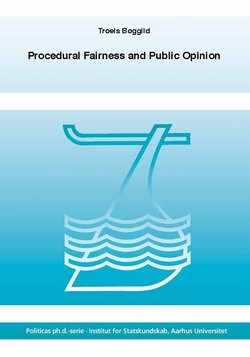Troels Bøggild
Procedural Fairness and Public Opinion

This dissertation advances our understanding of what makes citizens trust their politicians and support the political decisions they introduce. Most existing research considers citizens’ political trust and policy support a direct function of the favorability of the outcomes they receive from the political system, for example in terms of ideologically appealing policies, a prospering economy, or material benefits. The dissertation shows that whether citizens trust a political decision maker and support their policy also depends on the decision maker’s adherence to a set of procedural fairness criteria when introducing the policy. Did the political decision maker have a personal, vested interest in introducing the policy? Were all relevant parties included in the decision-making process? Was everyone allowed to voice their opinions before the decision was made? The dissertation draws on social and evolutionary psychology and develops a theoretical framework suggesting that citizens’ attention to procedural fairness stems from a deep-seated concern with avoiding exploitation or “cheating” behavior when decision-making authority is delegated to group leaders. A series of experiments show that information on procedural fairness shapes citizens’ trust in and inclinations to vote for politicians and support for public policies. Moreover, citizens possess a sophisticated cheater-avoidance psychology, which allows them, despite typical low levels of political knowledge and sophistication, to effectively remember and distinguish between politicians based on information on procedural fairness. The findings put the debate on the motivations and cognitive abilities of the democratic citizen in a new light with implications at the normative, theoretical, and methodological levels.
![]() Ophavsretten tilhører Politica. Materialet må ikke bruges eller distribueres i kommercielt øjemed.
Ophavsretten tilhører Politica. Materialet må ikke bruges eller distribueres i kommercielt øjemed.